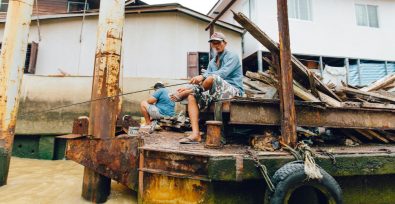One in every five fish is caught through illegal, unreported, and unregulated fishing, often in conditions rife with worker abuse. The United Nations estimates that approximately 128,000 workers are currently ensnared in forced labor on remote fishing vessels worldwide.
According to the US Department of Labor, child labor or forced labor has been observed in the production of various seafood items in at least 20 countries, underscoring the global scale of the issue.
Deputy Secretary for International Labor Affairs at the US Department of Labor, Thea Lee, notes,
Fishing is just an extraordinarily problematic industry. There are so many things about it both physically and economically that make it very, very vulnerable and it’s not just child labor and forced labor but every other problem, in particular safety and health violations, but also freedom of association, collective bargaining, all the fundamental labor rights and discrimination. Every fundamental labor right is probably broken a lot.
Real-life nightmares
Heart-wrenching accounts from exploited workers shed light on the harrowing realities of life at sea. One worker narrated how he was blinded in one eye after a fishing line accident, yet was forced by the ship’s captain to continue working without medical assistance.
Although I was clearly in need of medical help, my captain forced me to continue working for another month on the high seas. I was allowed to rest for only a few days and then I treated my injury using antibiotics and paracetamol that I brought with me to relieve the pain.
Others shared similar tales of abuse and neglect, painting a grim picture of the industry’s human toll. A migrant fisher from Indonesia described being kept at sea for two years, enduring physical assaults and grueling work conditions. Despite injuries and pleas for help, workers like him were denied medical care and subjected to relentless mistreatment.
One fisherman recounted a chilling experience of witnessing what he believes was a murder that was covered up as suicide.
Chairman of the Indonesia Seafarers Gathering Forum (Fospi), Achmad Mudzakir told the Guardian that workers face deportation without compensation for reporting such abuses.
We generate a lot of profits for both Taiwan and Indonesia. But although we work for more than 14 hours a day, we only receive about $550 per month and this is the lowest among all migrant groups in Taiwan… Sometimes we don’t have enough food or water. We often have to gather rainwater or the water dripping from air conditioners for basic necessities like bathing or drinking… A lot of workers experience verbal and physical abuse. They experience constrained mobility and isolation. About 80 to 90% of our members do not have identity documents with them because these documents are confiscated by their agencies.
“The onus is really on governments and corporations to fix this problem.”
Advocates are rallying behind collaborative solutions to address labor abuses in the fishing industry. Initiatives such as mandating wifi access for workers, publishing vessel license information, and enforcing regulations on seafood corporations are gaining traction.
Meanwhile, the lack of transparency and accountability in seafood supply chains has allowed corporations to evade responsibility for the welfare of workers, raising questions about their commitment to ethical sourcing practices. Brands such as Walmart and Costco, which source seafood from Taiwan, have come under fire for their complicity in profiting from exploited labor.
According to Lee, “There’s a lot of work to be done.”







Freedom United is interested in hearing from our community and welcomes relevant, informed comments, advice, and insights that advance the conversation around our campaigns and advocacy. We value inclusivity and respect within our community. To be approved, your comments should be civil.
This seems to be a grave problem. It has to be tackled with care as fishermen are already sacrificing their lives in sea. If their working conditions are bad then their survival is very difficult. Nice eye opener message for many of us. Thanks.
Where can I buy humanely sourced seafood?
Company’s like Costco and Walmart need to be held responsible for purchasing food/items that are attached to such abusive industries
I’ve known about this for the past few months. I thought it only happened on Chinese vessels. I stopped buy fish from China, after seeing the documentary about human rights abuses on fishing vessels from that country. I now buy only Canadian or American fish, having decided to boycott Chinese Fish. I haven’t seen any other fish for sale here from South East Asia. However, I think I’ll be boycotting that fish, too.
This article seems fishy to me